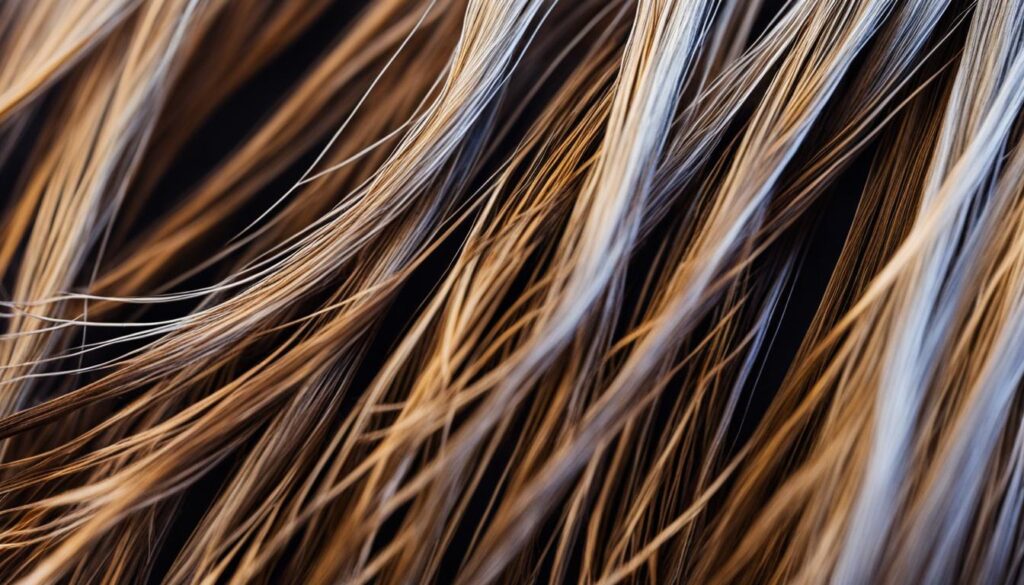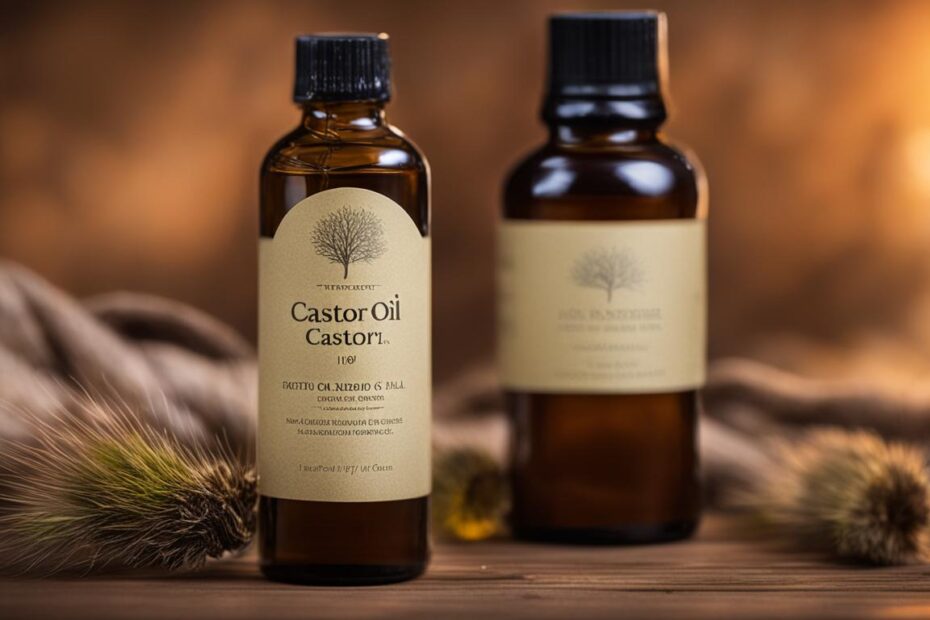When it comes to finding solutions for hair regrowth, many people turn to natural remedies. One such remedy that has gained popularity is castor oil. But the question remains: Will castor oil actually help hair regrow?
Unfortunately, there is no scientific proof to support the claim that castor oil can help hair regrow. Although castor oil is known for its natural antiviral and antimicrobial properties, there is no clinical evidence to back up the claims that it promotes hair growth or treats hair loss. However, that does not mean castor oil is without its benefits.
Key Takeaways:
- There is no scientific evidence to support the claim that castor oil helps hair regrow.
- Castor oil is known for its natural antiviral and antimicrobial properties.
- Although some people use castor oil for hair growth, there is no clinical evidence to support its effectiveness in promoting hair regrowth.
- Consulting a healthcare provider is recommended for proven therapies and treatments for hair loss.
- Experts express skepticism about the effectiveness of castor oil for hair growth.
The Use of Castor Oil for Hair Growth
Castor oil has gained popularity as a potential solution for hair growth and improving the condition of the scalp. Many individuals claim that using castor oil once a month can stimulate hair growth three to five times faster than the normal rate. However, it is important to note that there is no scientific evidence to support these claims.
Alopecia, a condition characterized by hair loss or baldness, is another area where castor oil is frequently used. Some people believe that the application of castor oil to the scalp can help in the regrowth of hair in individuals suffering from alopecia. Similarly, castor oil is also considered beneficial in managing dry scalp, which is often associated with itching and flaking.
| Hair Benefits | Potential Uses |
|---|---|
| Promotes hair growth | Alopecia |
| Improves scalp condition | Dry scalp |
While anecdotal evidence and personal testimonials suggest the efficacy of castor oil for hair growth, it is essential to seek evidence-based recommendations for addressing hair loss and promoting scalp health.
It is worth noting that castor oil is known for its ricinoleic acid content, which possesses anti-inflammatory, antimicrobial, and moisturizing properties. These properties contribute to the overall maintenance of a healthy scalp environment. However, further research and scientific studies are required to ascertain the specific benefits of castor oil for hair growth and its ability to combat conditions like alopecia and dry scalp.
How to Apply Castor Oil to the Hair
If you still want to try castor oil on your hair, there is a safe and easy method to apply it at home. Follow these steps:
- Section off the hair: Start by dividing your hair into manageable sections using clips or hair ties. This will make it easier to apply the castor oil evenly.
- Apply the oil to the scalp and hair: Put on rubber gloves to protect your hands and prevent any staining. Using an applicator brush, apply the castor oil to your scalp, focusing on areas where you want to promote hair growth. Gently massage the oil into your scalp for a few minutes, then work the remaining oil down to the ends of your hair.
- Cover with a shower cap: Once you’ve applied the castor oil, cover your hair with a shower cap to trap heat and promote better absorption.
- Leave it on for at least two hours: For optimal results, leave the castor oil on your hair for a minimum of two hours. You can also leave it on overnight if desired.
- Wash the hair: After the recommended time has passed, remove the shower cap and wash your hair with a gentle shampoo and conditioner. Be sure to thoroughly rinse out the castor oil to prevent any residue.
This method allows the castor oil to penetrate the hair follicles and nourish the scalp, promoting healthy hair growth. It is important to note that individual results may vary, and consistency is key when using castor oil for hair care.
Remember, castor oil can be quite thick and sticky, so using it sparingly is recommended. You can also mix it with a carrier oil like coconut or olive oil to make application easier. Additionally, if you have any underlying scalp conditions or allergies, it is advisable to consult with a dermatologist before using castor oil on your hair.
Lack of Scientific Evidence
According to experts, there is no scientific evidence to support the effectiveness of castor oil for hair growth. Claims about its benefits, including preventing or treating skin cancer and promoting hair regrowth, are only anecdotal. While castor oil has been used for centuries in various traditional medicine practices, modern scientific research has not yet provided concrete evidence to validate its alleged properties.
It is important to approach claims about castor oil’s hair growth potential with skepticism, as they primarily stem from personal anecdotes rather than rigorous scientific studies. Despite its long history of use, castor oil’s effectiveness remains a subject of myth and speculation. Scientifically supported treatments and therapies for addressing hair loss should always be prioritized, and consultation with a healthcare provider is highly recommended when seeking proper guidance.
Experts’ Perspectives
“While castor oil is often recommended as a natural remedy for hair growth, it is crucial to note that this assertion lacks scientific evidence. Claims about its efficacy are largely based on personal experiences and have not been validated through structured research studies. To ensure optimal hair health, individuals should seek advice from qualified professionals who can provide evidence-based treatment options.”
Scientific evidence plays a significant role in determining the efficacy of any treatment, including those related to hair growth. However, current research on castor oil’s impact on hair regrowth is limited and inconclusive. While castor oil may possess certain properties that promote scalp health and hair conditioning, such properties do not necessarily translate to significant hair regrowth. It is crucial to rely on scientifically proven treatments for managing hair loss and to dispel any myths surrounding castor oil’s alleged benefits.

Despite the lack of scientific evidence, castor oil continues to be a popular choice for hair care among individuals seeking natural remedies. However, it is important to approach its use with caution and not solely rely on anecdotal claims. Consulting with a healthcare professional or qualified dermatologist can provide valuable insights and personalized recommendations regarding treatments and therapies for hair loss. Evidence-based approaches are crucial for addressing hair concerns effectively.
Expert Opinions on Castor Oil
When it comes to the effectiveness of castor oil for hair growth, skepticism arises among cosmetic chemists and dermatologists. They emphasize that there is no scientific theory or evidence to support the popular claim. While castor oil may possess conditioning properties and nourish the hair, there is no definitive proof that it promotes hair regrowth. Additionally, some individuals may experience allergic reactions and inflammation when using castor oil.
The Skepticism of Experts
According to leading experts in cosmetic chemistry and dermatology, the claims surrounding hair growth and castor oil remain unsubstantiated. These professionals stress the absence of scientific studies and evidence supporting the idea that castor oil stimulates hair regrowth. While it may provide certain benefits, such as conditioning and moisturizing the hair, its impact on promoting new hair growth lacks concrete scientific backing.
“There is currently no scientific evidence to support the use of castor oil as a hair growth treatment. Claims about its effectiveness are purely anecdotal.” – Dr. Emily Thompson, Dermatologist
Allergic Reactions and Inflammation
It’s important to consider potential allergic reactions when using castor oil for hair care. While it is generally considered safe, some individuals may have sensitivities or allergies to castor oil, leading to inflammation, redness, or itching on the scalp. If any adverse reactions occur, it is recommended to discontinue the use of castor oil and consult a healthcare professional.
Expert Recommendation
Given the limited scientific evidence and the potential for adverse reactions, experts advise caution when using castor oil for hair growth. Instead, individuals experiencing hair loss or seeking hair regrowth treatments are encouraged to explore proven therapies and consult with a healthcare provider for personalized advice and treatment options.

| Expert Opinions on Castor Oil | Summary |
|---|---|
| Castor oil has no scientific backing for promoting hair growth. | There is no concrete evidence supporting the claim that castor oil stimulates hair regrowth. |
| Potential allergic reactions and inflammation may occur. | Some individuals may experience allergic reactions, leading to scalp inflammation and discomfort. |
| Consult a healthcare professional for proven hair loss treatments. | It is recommended to seek professional guidance and explore evidence-based treatments for hair loss. |
Hair Matting and Castor Oil
In rare cases, the use of castor oil on the hair has been associated with acute hair matting or felting. This condition causes the hair to become twisted and entangled, resembling a bird’s nest. Hair matting can occur when the high viscosity and sticky consistency of castor oil, combined with long hair, result in tangled hair. Acute hair matting is irreversible and may have a serious psychological impact on the individual.
If you’re considering using castor oil for hair care, it’s important to be aware of the potential risk of hair matting. While the majority of individuals who use castor oil do not experience this issue, it’s crucial to be informed and take precautions to prevent hair matting.
One way to reduce the risk of hair matting is by properly diluting the castor oil before applying it to your hair and scalp. Diluting the oil with a carrier oil, such as coconut oil or olive oil, can help make it less sticky and easier to distribute throughout the hair. Additionally, avoid using excessive amounts of castor oil and focus on applying it primarily to the scalp rather than the hair strands.
Remember, everyone’s hair is unique, and what works for one person may not work for another. If you experience any unusual reactions or hair matting after using castor oil, it’s best to discontinue use and consult a healthcare professional or trichologist for guidance.

| Causes of Hair Matting | Preventive Measures |
|---|---|
| The high viscosity of castor oil | Dilute castor oil before application |
| Sticky consistency of castor oil | Apply sparingly and primarily to the scalp |
| Long hair | Properly detangle and comb hair regularly |
Hair matting can be a frustrating and distressing problem. Therefore, it’s important to exercise caution when using castor oil and to prioritize the health and well-being of your hair and scalp.
Hair Matting and Religious Customs
Hair matting, known as plica polonica, has been historically associated with cultural and religious customs, particularly in South India. Growing long hair and taking oil baths are traditional practices in this region. These customs have deep roots and are considered important for spiritual and personal reasons. While long, luscious hair is cherished, it also comes with challenges in terms of maintenance and care.
However, acute hair matting can occur in individuals with neglected hair or underlying psychiatric illness. It is a condition where the hair becomes severely tangled, like a bird’s nest, leading to difficulties in combing and managing the hair. This condition is irreversible and may require drastic measures such as cutting off the affected hair.
Interestingly, the use of castor oil, along with coconut oil, for hair growth and washing has been linked to sudden hair matting. The viscous consistency of castor oil, combined with its sticky nature, can contribute to tangled and matted hair when used excessively or improperly. This highlights the importance of understanding proper hair care techniques and avoiding excessive application of oils.
Religious customs often prescribe the use of oils for nourishing the scalp and promoting healthy hair. While there are many benefits to using oils for hair care, moderation and proper application methods are crucial to prevent hair matting. It is advisable to consult with experts in religious customs, hair care professionals, or dermatologists to ensure the correct practices and prevent undesirable outcomes.
Traditional Hair Care Practices in South India
In South India, various religious and cultural customs revolve around hair care. Growing long, thick hair is highly regarded and is often considered a symbol of beauty and prosperity. The practice of oiling the hair with natural oils, including castor oil and coconut oil, is deeply rooted in traditions.
Oil baths, known as “abhyanga snana,” are an essential part of the daily routine for many people in this region. These baths involve massaging warm oil onto the scalp and hair, followed by a thorough cleansing with natural herbal powders or mild shampoos. The oil is believed to nourish the scalp, promote hair growth, and keep the hair healthy and lustrous.
While these customs have been followed for generations, it is important to note that excessive or improper use of oils can lead to adverse effects, such as hair matting. The key lies in striking a balance between tradition and modern hair care practices, ensuring that the scalp and hair receive proper nourishment without compromising their health.
| Religious Customs and Hair Matting: Pros and Cons | |
|---|---|
| Pros | Cons |
|
|
The Case of Acute Hair Matting
A case report describes a woman who experienced acute hair matting immediately after using coconut oil and castor oil on her hair. The combination of long hair, the high viscosity of castor oil, and washing the hair with warm water led to the hair becoming matted and tangled. Acute hair matting is considered a rare disorder, and in this case, the affected hair had to be cut off due to its irreversible nature.
Acute hair matting, also known as felting, is a condition where the hair becomes twisted and entangled, resembling a bird’s nest. It typically occurs when the hair is neglected, lacks regular care, or is subjected to certain hair products or treatments. In the specific case mentioned, the use of coconut oil and castor oil, combined with the hair’s length and subsequent washing, led to the development of acute hair matting.
Acutely matted hair is a rare condition that primarily occurs in individuals with long hair who do not engage in proper hair care practices or those with certain underlying psychiatric disorders. The use of certain hair products, including castor oil, can exacerbate the risk of hair matting.
Acute hair matting is a distressing condition both physically and psychologically, as it can affect a person’s self-image and confidence. Treatment for acute hair matting primarily involves removing the matted hair through cutting or shaving. It is crucial to seek professional help from a dermatologist or trichologist to address the underlying causes and ensure proper hair care moving forward.
The Lack of Scientific Studies on Castor Oil and Hair
When it comes to the uses and benefits of castor oil for hair growth, there is a significant lack of scientific studies and reports. While castor oil has been believed to promote hair growth and widely used in alternative medicines, its effectiveness has not been established scientifically. Although castor oil contains ricinoleic acid, which is thought to improve circulation in the scalp, these claims remain speculative. Instead of concrete scientific evidence, the main source of testimonials regarding the effects of castor oil on hair growth comes from anecdotal evidence found on blogs and online platforms.
Without rigorous scientific scrutiny, it is challenging to determine the actual efficacy of castor oil for hair growth. While many individuals may have experienced positive results, it is important to consider the absence of controlled studies before drawing definitive conclusions. Anecdotal evidence, although compelling, should be taken with caution as it may be influenced by various factors such as personal biases and the placebo effect.
Without scientific studies to support its claims, the effectiveness of castor oil for hair growth remains a subject of controversy. We recommend exercising critical thinking and seeking professional advice when considering the use of castor oil as part of your hair care routine.
Possible Risks and Side Effects
While castor oil is generally considered safe for use on the hair and scalp, it is essential to be aware of potential risks and side effects. Some individuals may be allergic to castor oil, resulting in inflammation, itching, or rashes. It is always advisable to perform a patch test before applying any new product to the skin or hair.
Additionally, the high viscosity and sticky consistency of castor oil can pose a risk of hair matting or felting in rare cases. Acute hair matting occurs when the hair becomes twisted and entangled, often resembling a bird’s nest. This condition can have a significant psychological impact on individuals affected by it. It is crucial to follow proper application methods, use the appropriate amount of castor oil, and avoid excessive and prolonged exposure to minimize the risk of hair matting.
In summary, while castor oil has gained popularity for its potential benefits in promoting hair growth, the lack of scientific studies makes it difficult to definitively determine its efficacy. Understanding the limitations of anecdotal evidence and being aware of possible risks and side effects is essential when considering the use of castor oil for hair care.
| Pros | Cons |
|---|---|
| May improve scalp circulation | Lack of scientific evidence |
| Potential moisturizing properties | Possible risk of hair matting |
| Accessible and affordable | Possible allergic reactions |
Although castor oil offers potential benefits for hair growth, it is crucial to approach its use with a critical mindset and consider consulting a healthcare professional for personalized advice and treatment options.
Conclusion
In conclusion, there is no scientific evidence to support the claim that castor oil can help hair regrow. While castor oil is popularly used for hair growth and improving scalp conditions, such as dryness and alopecia, its effectiveness remains largely anecdotal. Despite claims of stimulating hair growth three to five times the normal rate, there is no clinical data to support these assertions.
Experts recommend exploring proven therapies for hair loss, such as FDA-approved medications and regenerative treatments like hair transplantation. Consulting a healthcare provider for personalized advice and treatment options is crucial when addressing hair loss concerns.
While castor oil is known for its natural antiviral and antimicrobial properties, making it popular for treating skin problems and fungal infections, its potential benefits for hair regrowth warrant further scientific investigation. Until more conclusive evidence is available, it is important to approach claims about the effectiveness of castor oil for hair growth with caution and rely on proven medical interventions.
FAQ
Will Castor Oil Help Hair Regrow?
There is no scientific proof to support the claim that castor oil can help hair regrow. While some people use castor oil for hair growth and to treat hair loss, there is no clinical evidence to support these claims. However, castor oil is known for its natural antiviral and antimicrobial properties, making it popular for treating skin problems and fungal infections.
What is the use of castor oil for hair growth?
Castor oil is marketed as a treatment for hair growth and to improve the condition of the scalp. Some claim that using castor oil once a month can stimulate hair growth three to five times the normal rate, but there is no scientific evidence to support this. It is also used for conditions such as alopecia and dry scalp.
How can I apply castor oil to my hair?
If you still want to try castor oil on your hair, there is a safe and easy method to apply it at home. You will need castor oil, an old T-shirt, rubber gloves, an applicator brush, a comb, a shower cap, and a large towel. The steps include sectioning off the hair, applying the oil to the scalp and hair, covering it with a shower cap, leaving it on for at least two hours, and then washing the hair with shampoo and conditioner.
Is there any scientific evidence to support the effectiveness of castor oil for hair growth?
According to experts, there is no scientific evidence to support the effectiveness of castor oil for hair growth. Claims about its benefits, including preventing or treating skin cancer and promoting hair regrowth, are only anecdotal. It is important to consult a healthcare provider for proven therapies and treatments for hair loss.
What is the opinion of experts on castor oil for hair growth?
Cosmetic chemists and dermatologists express skepticism about the effectiveness of castor oil for hair growth. They state that there is no scientific theory or evidence to support this claim. While castor oil may have conditioning properties and nourish the hair, there is no definitive proof that it promotes hair regrowth. Some people may even be allergic to castor oil and experience inflammation.
Can using castor oil on the hair cause hair matting?
In rare cases, the use of castor oil on the hair has been associated with acute hair matting or felting. This condition causes the hair to become twisted and entangled, resembling a bird’s nest. Hair matting can occur when the high viscosity and sticky consistency of castor oil, combined with long hair, result in tangled hair. Acute hair matting is irreversible and may have a serious psychological impact on the individual.
Is hair matting a part of any religious customs?
Hair matting, known as plica polonica, has been historically associated with cultural and religious customs, particularly in South India. Growing long hair and taking oil baths are traditional practices in this region. However, acute hair matting can occur in individuals with neglected hair or underlying psychiatric illness. The use of castor oil, along with coconut oil, for hair growth and washing has been linked to sudden hair matting.
Are there any reported cases of acute hair matting caused by castor oil?
A case report describes a woman who experienced acute hair matting immediately after using coconut oil and castor oil on her hair. The combination of long hair, the high viscosity of castor oil, and washing the hair with warm water led to the hair becoming matted and tangled. Acute hair matting is considered a rare disorder, and in this case, the affected hair had to be cut off due to its irreversible nature.
Are there scientific studies on the uses and benefits of castor oil for hair growth?
There is a lack of scientific studies and reports on the uses and benefits of castor oil for hair growth. While it has been believed to promote hair growth and used in alternative medicines, its effectiveness has not been proven scientifically. Castor oil is known for its ricinoleic acid content, which may improve circulation in the scalp, but these claims are speculative. Anecdotal evidence, primarily from blogs and online platforms, is often the main source of testimonials regarding castor oil for hair growth.
What is the conclusion regarding the effectiveness of castor oil for hair regrowth?
In conclusion, there is no scientific evidence to support the claim that castor oil can help hair regrow. While it is popularly used for hair growth and to improve scalp conditions, such as dryness and alopecia, the effectiveness of castor oil is largely anecdotal. Experts recommend exploring proven therapies for hair loss and consulting a healthcare provider for personalized advice and treatment options.
